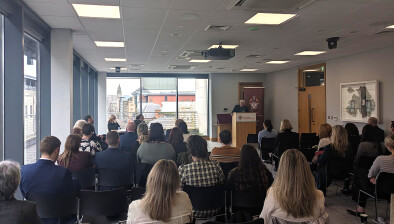Peter McKenna: eVoting brings Law Society into the 21st century

Peter McKenna
Peter McKenna explains the significance of this year’s Law Society Council elections — the first with electronic voting in place.
The Law Society Council election is held every year in which 15—16 ordinary members, and two provincial delegates, are elected to serve for a two-year period. These elections are extremely important.
The Council is the governing body of the Law Society that, at its essence, is responsible for shaping and developing the future of the legal profession. For solicitors, our profession is our livelihood. For society, a healthy functioning legal profession is crucial.
Having a say as to who represents us on the Council, in such an important role, it would be expected that voting return rates by members would be high. There was no election last year, due to a lack of candidates but in 2021, it was approximately 24 per cent.
It’s been steadily declining over recent years; returned postal votes were down by 30 per cent since 2019. More concerning, however, was that returned votes went down by almost 12 per cent between 2020-2021, after there was a return to work from the Covid pandemic, when an increase would have been expected. It became obvious that something needed to change.
So, what is eVoting?
eVoting is a user-friendly election system that allows members put themselves forward for nomination and to cast votes electronically, which can be through a website, mobile app, or any internet-connected device, such as a personal computer, laptop, iPad, tablet, or smartphone, at the location of the member’s choice.
At its core, an eVoting system facilitates encrypted nomination and voting that is secret and secure, and protects the integrity of the vote by preventing non-members from engaging and ensuring eligible voters may only vote once. It eliminates the need to nominate candidates or cast votes using paper and closely scrutinises the results in real-time, reducing the cost and time involved in sending out, collecting in, and counting votes.
Therefore, in mid-2021, the Law Society’s technology committee set about investigating the potential benefits and practicalities of eVoting for our profession.
Expected improvements
We found that, typically, eVoters have a better voting experience with less friction. They are able to vote more easily and efficiently.
eVoting was more accessible than traditional voting systems by facilitating voters who live or work in remote areas, temporarily live abroad but are working remotely, may be on holidays during the voting window, are on maternity leave, have disabilities for whom the practicalities of postal voting can be challenging, and who cannot/do not want to leave their house (e.g. due to familial demands or a health condition).
eVoting protects the health of the most vulnerable voters and improves the accessibility of voters with functional diversity. Typically, there is also a 75—80 per cent reduction in the cost of holding such e-elections compared to paper-based voting systems.
Our investigations found that eVoting was the main form of voting for many professions such as the aforementioned Chartered Accountants Ireland, the Law Society of England and Wales, the Royal Institute of the Architects of Ireland (RIAI) and the Chartered Institute of Management Accountants.
We also spoke to members who used eVoting at AGMs when serving on various boards for large organisations. The reports back were overwhelmingly positive.
Vote for change
Therefore, at the AGM of the Law Society in November 2021 a motion was passed calling on the Society to introduce eVoting in Council elections. This motion led to a further special general meeting of the Society in March 2022 to give effect to the changes required in the bye-laws to implement eVoting, which changes were passed by a majority of 97 per cent.
The strong support for use of such technologies was fully reflected in the fact that 10 times more voters attended the SGM remotely than in person. It was a significant moment.
By introducing the ability to eVote, we reformed our voting system and brought it firmly into the 21st century. It was one small step in amending the bye-laws, but one giant leap forward in how we now communicate and engage as a profession.
The members voted for change and the Law Society listened and acted. Steps were taken to put in place a voting system that makes it easier and far more accessible for our members to vote.
Last year, there was no election due to a lack of candidates. E-nomination was introduced to make the nomination process easier. This year we have 22 candidates who put themselves forward for 16 places. We expect this increased engagement to be reflected in the numbers who eVote in the Law Society Council elections.
- Peter McKenna is chair of the Law Society of Ireland’s technology committee. eVoting in the Law Society Council election closes on 2 November 2023 and members can vote by clicking here.










